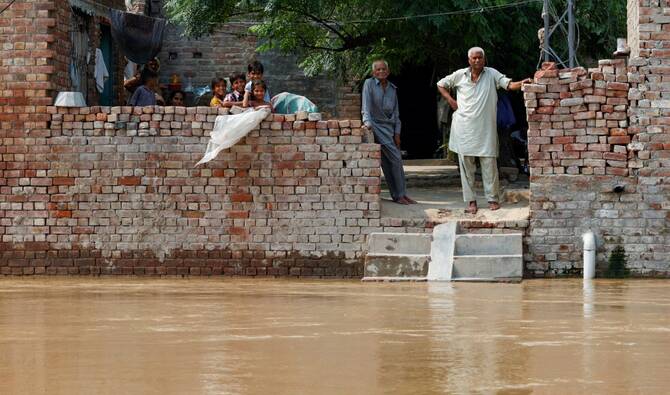The devastating force of Pakistan monsoon floods has claimed nearly 800 lives this season, prompting global sympathy and calls for urgent action. Among the voices of solidarity, Bahrain extended heartfelt condolences to Pakistan, underscoring the severity of the crisis and the need for international cooperation in facing natural disasters.
Bahrain’s Message of Solidarity
On Sunday, Bahrain’s Interior Minister, Lt. Gen. Rashid bin Abdullah Al-Khalifa, spoke with Pakistan’s Interior Minister Mohsin Naqvi to express sorrow over the tragic loss of life. He conveyed Bahrain’s condolences and assured Pakistan that his country stood with the victims in this difficult time.
“Bahrain stands with its Pakistani brothers and sisters in this difficult hour and is ready to help the flood victims,” he said, highlighting Bahrain’s readiness to provide assistance.
Naqvi thanked the Bahraini leadership for its message of solidarity and stressed that the destruction caused by the monsoon rains could hardly be expressed in words. The exchange reflected the close bonds between the two nations and the shared grief in the face of human suffering.
Rising Death Toll Across Provinces
According to the National Disaster Management Authority (NDMA), since June 26, the relentless rains and flooding have killed 798 people across Pakistan. The casualties reveal the widespread scale of destruction.
Khyber Pakhtunkhwa (KP) has been the hardest hit, reporting 479 deaths. Punjab has recorded 165 fatalities, while Sindh has lost 54 lives. Gilgit-Baltistan reported 45 deaths, Balochistan 24, Azad Jammu and Kashmir 23, and Islamabad eight.
The figures continue to rise as heavy rains persist, leaving thousands displaced and entire communities cut off from relief supplies.
A Growing Threat
Authorities have warned that monsoon showers, expected to last until September 10, could unleash floods comparable to those witnessed in 2010. That year, Pakistan suffered one of the worst floods in its history, which killed over 1,700 people and displaced millions.
The looming threat has placed relief agencies and th e government on high alert. Prime Minister Shehbaz Sharif has directed federal and provincial authorities to remain fully prepared for emergency operations in the coming days, especially in the country’s low-lying areas.
Read: Pakistani Army Called Ballast of Stability by Chinese FM
Lessons from the Past
The fear of a repeat of past catastrophes lingers heavily in Pakistan. The 2022 floods remain fresh in memory. Triggered by unusually heavy monsoon rains and glacier melt, those floods submerged nearly one-third of the country, killed over 1,700 people, and caused an estimated $30 billion in damages.
The latest deluges, though not yet on the same scale, have already devastated agriculture, infrastructure, and homes in multiple regions. Many worry that with weeks of rain still ahead, the losses could grow dramatically.
The Human Toll
Behind the statistics lie heartbreaking stories of families losing loved ones, homes, and livelihoods. Villages along the Sutlej River in Punjab have seen residents forced to abandon their houses as rising waters sweep through their lands. Farmers watch helplessly as crops are destroyed, while thousands of children remain at risk of waterborne diseases.
In Khyber Pakhtunkhwa, rescue teams struggle to reach remote mountainous areas where landslides have cut off access. In Sindh and Balochistan, poor infrastructure makes relief delivery even more difficult, further compounding the misery of displaced communities.
Government’s Response
The federal and provincial governments have mobilized emergency services and military units to assist in rescue and relief efforts. Camps have been set up for displaced families, though overcrowding and shortages remain major concerns.
The Prime Minister’s Office issued a statement urging all departments to coordinate relief work and prepare for worsening conditions. “The prime minister directed all concerned authorities to be fully prepared for relief operations in the lower parts of the country in view of the flood situation in the coming days,” the statement read.
Climate Change Vulnerability
Pakistan’s plight once again highlights the country’s vulnerability to climate change. Despite contributing less than 1 percent to global greenhouse gas emissions, Pakistan ranks among the nations most exposed to extreme weather events.
Climate experts warn that unpredictable rainfall patterns, rising temperatures, and rapid glacier melt will likely make floods more frequent and more severe. Without large-scale investment in climate resilience and disaster preparedness, the cycle of destruction may continue.
International Support
Pakistan has often relied on international support in times of natural disaster. Following the 2022 floods, aid poured in from multiple countries and organizations, helping the nation cope with the overwhelming damage. Bahrain’s recent expression of solidarity suggests that once again, Pakistan’s plight is drawing attention beyond its borders.
For many observers, such expressions of friendship go beyond immediate relief. They demonstrate how shared challenges like climate change require collective responses.
A Nation on Edge
As rains continue to pound Pakistan, millions remain at risk. The NDMA has warned that the coming weeks will be crucial in determining whether the floods worsen into a disaster of historic proportions.
With memories of 2010 and 2022 still haunting the nation, the government faces an enormous challenge. The resilience of the Pakistani people, combined with international support, will play a decisive role in overcoming the tragedy.
What remains clear is that the ongoing Pakistan monsoon floods have once again exposed the urgent need for long-term climate adaptation and disaster planning. In a country where each monsoon season threatens to bring new tragedy, survival depends on preparation, solidarity, and resilience.
Follow us on Instagram, YouTube, Facebook,, X and TikTok for latest updates
